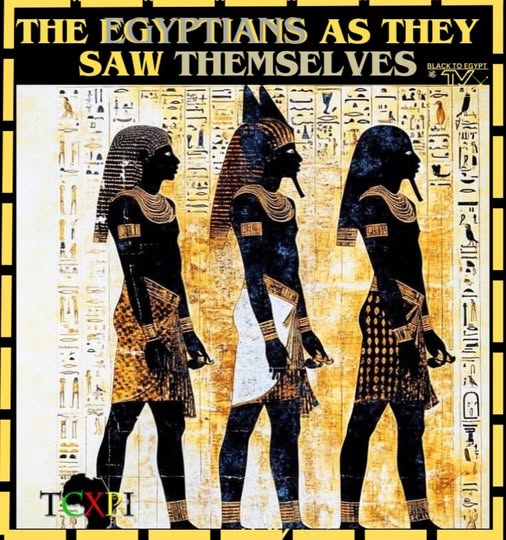
The Egyptians as they saw themselves

How did the ancient Egyptians see themselves? Into which ethnic category did they put themselves? What did they call themselves? The language and literature left to us by the Egyptians of the Pharaonic epoch supply explicit answers to these questions which the scholars cannot refrain from minimizing, twisting or ‘interpreting’.
The Egyptians had only one term to designate themselves: kmt = the negroes (literally). This is the strongest term existing in the Pharaonic tongue to indicate blackness; it is accordingly written with a hieroglyph representing a length of wood charred at the end and not crocodile scales. This word is the etymological origin of the well-known root kamit which has proliferated in modern anthropological literature.
The biblical root kam is probably derived from it and it has therefore been necessary to distort the facts to enable this root today to mean ‘white’ in Egyptological terms whereas, in the Pharaonic mother tongue which gave it birth, it meant ‘coal black’.
In the Egyptian language, a word of ᴀssembly is formed from an adjective or a noun by putting it in the feminine singular. ‘ Kmt ‘ from the adjective = km = black; it therefore means strictly negroes or at the very least black men. The term is a collective noun which thus described the whole people of Pharaonic Egypt as a black people.
In other words, on the purely grammatical plane, if one wishes to indicate negroes in the Pharaonic tongue, one cannot use any other word than the very one which the Egyptians used of themselves. Furthermore, the language offers us another term, kmtjw = the negroes, the black men (literally) = the Egyptians, as opposed to ‘foreigners’ which comes from the same root km and which the Egyptians also used to describe themselves as a people as distinguished from all foreign peoples. These are the only adjectives of nationality used by the Egyptians to designate themselves and both mean ‘negro’ or ‘black’ in the Pharaonic language. [Eurocentric] scholars hardly ever mention them or when they do it is to translate them by euphemisms such as the ‘Egyptians’ while remaining completely silent about their etymological sense.
Cheikh Anta Diop (29 December 1923 – 7 February 1986), an Afrikan anthropologist, historian, and physicist. One of the most prominent and proficient black scholars in the history of African civilization. His discoveries have shown the world the true accomplishments of African history, and effectively put an end to the debate over who the original people of Egypt were.
From General History of Africa. Vol.II. Ancient Civilisations of Africa. Chapter 1. Origin of the ancient Egyptians.


